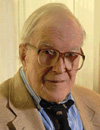BELLINGHAM, Washington, USA -- SPIE has announced the establishment of a new award for biomedical optics honoring researcher Britton Chance, who died last month at the age of 97. The first Britton Chance Biomedical Optics Award will be presented at SPIE Photonics West in 2012.
The award will be presented annually to recognize outstanding contributions to the field of biomedical optics through the development of innovative, high-impact biophotonic technologies. In particular, the award will acknowledge pioneering contributions to biophotonic methods and devices that have significant promise to accelerate or have already facilitated new discoveries in biology or medicine, and will target achievements that span disciplines and may include elements of basic research, technology development, and clinical translation.
"Brit Chance's research, training, and leadership have helped fuel the growth of biomedical optics and biophotonics throughout the world," said Bruce Tromberg, Director of the Beckman Laser Institute at the University of California, Irvine, and a longtime colleague of Chance.
"His lifelong passion for measuring and understanding physiology and metabolism using light has inspired our community for decades. More than any other individual, Brit brought together people and ideas that spanned across disciplines, creating a special spirit of creativity, innovation, and enthusiasm that has characterized the field of biomedical optics," Tromberg said.
Chance died on 16 November. He was the Eldridge Reeves Johnson Professor Emeritus of Biochemistry and Biophysics, and Professor Emeritus of Physical Chemistry and Radiological Physics at the School of Medicine of the University of Pennsylvania (Penn). Chance obtained two PhDs, one in physical chemistry at Penn in 1940, and one in biology/physiology at Cambridge University in 1942. He became a member of Penn faculty in 1941 when he was appointed Assistant Professor of Biophysics and Physical Biochemistry in the School of Medicine.
Chance pioneered the field of biomedical optics, making important contributions in a number of areas. He helped in the identification of and functioning of enzyme-substrate compounds and made advancements in breast cancer diagnostics, rf electronics, spectroscopy as a noninvasive analytical tool for clinical diagnosis, and other areas.
Chance was an SPIE Fellow, co-edited the SPIE Press book Medical Optical Tomography: Functional Imaging and Monitoring and had been editor of the SPIE Journal of Biomedical Optics since its founding in 1996. He was the recipient of the SPIE President's Award in 2006.
A tribute booklet honoring Chance will be presented at the BiOS Hot Topics session during SPIE Photonics West, Saturday 22 January.
SPIE presents several yearly awards that recognize outstanding individual and team technical accomplishments and meritorious service to the Society, and invites nominations from the community. Nominations may be made through 1 October of any given year and are considered active for three years from the submission date. Visit SPIE.org/x1164.xml for instructions and nomination forms.
SPIE the international society for optics and photonics, was founded in 1955 to advance light-based technologies. Serving more than 180,000 constituents from 168 countries, the Society advances emerging technologies through interdisciplinary information exchange, continuing education, publications, patent precedent, and career and professional growth. SPIE annually organizes and sponsors approximately 25 major technical forums, exhibitions, and education programs in North America, Europe, Asia, and the South Pacific, and supports scholarships, grants, and other education programs around the world. See www.SPIE.org
# # # #
Media contact:
Stacey Crockett
Media Relations Coordinator
SPIE
Tel #1 360 685 5458
Twitter: twitter.com/SLCrockett
Email: staceyc@spie.org
Web: www.spie.org/pr